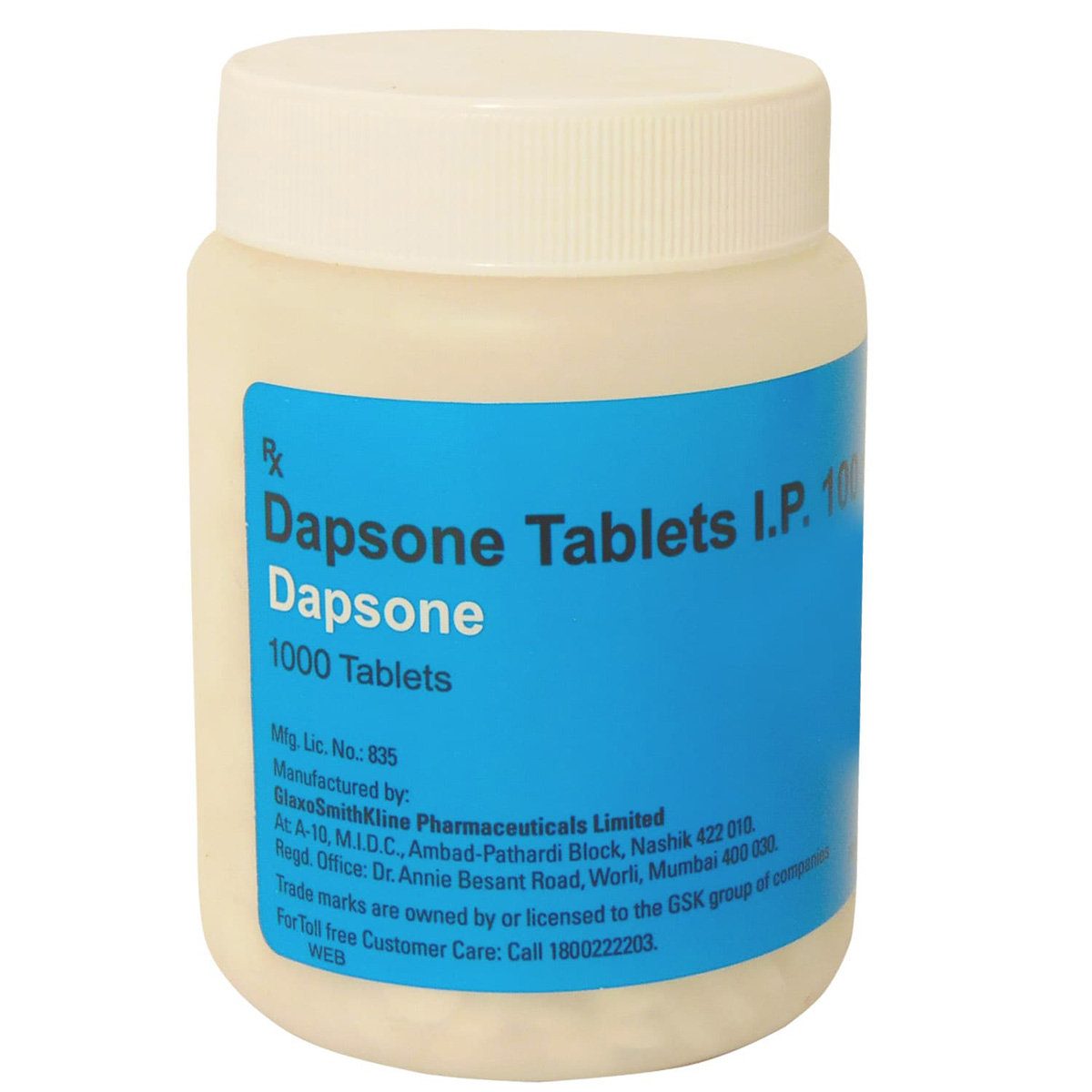Dapsone Tablet


MRP ₹430
(Inclusive of all Taxes)
₹64.5 Cashback (15%)
know your delivery time
Provide Delivery Location
Composition :
Manufacturer/Marketer :
Consume Type :
Expires on or after :
Return Policy :

Secure Payment

Trusted by 8 Crore Indians

Genuine Products
Therapeutic Class
Country of origin
Manufacturer/Marketer address
Author Details
We provide you with authentic, trustworthy and relevant information
FAQs
Disclaimer
Alcohol
Safe if prescribed
You are recommended to avoid alcohol consumption with Dapsone Tablet as it may worsen the side effects of Dapsone Tablet .
Pregnancy
Consult your doctor
Dapsone Tablet is not recommended for use during pregnancy unless your doctor prescribes it. Therefore, please inform your doctor if you are pregnant or planning pregnancy before taking Dapsone Tablet .
Breast Feeding
Consult your doctor
Dapsone may pass into breast milk. Therefore, it is recommended to avoid breastfeeding while taking Dapsone Tablet or discontinue using Dapsone Tablet while breastfeeding as this medicine may cause blood disorders in the babies. Hence, please inform your doctor if you are breastfeeding before taking Dapsone Tablet .
Driving
Safe if prescribed
Dapsone Tablet usually does not affect your ability to drive or operate machinery.
Liver
Consult your doctor
Take Dapsone Tablet with caution, if you have a history of liver diseases/conditions. Your doctor may adjust the dose of this medicine if necessary based on your condition.
Kidney
Consult your doctor
Take Dapsone Tablet with caution, if you have a history of kidney diseases/conditions. Your doctor may adjust the dose of this medicine if necessary based on your condition.
Children
Safe if prescribed
Children under the age of six should not use Dapsone Tablet because its safety and efficacy have not been proven. Typically, for kids older than 6 years, the dose is determined by the child's weight.
Product Substitutes
About Dapsone Tablet
Dapsone Tablet belongs to the class of anti-infectives used to treat leprosy (Hansen's disease), dermatitis herpetiformis (a skin problem) and Actinomycotic mycetoma (a fungal disease). Also, it is used in the prevention of malaria and pneumonia. Leprosy is an infectious disease that causes skin lesions and nerve damage.
Dapsone Tablet contains Dapsone which works by inhibiting the growth or killing bacteria or fungi that cause infection.
Take Dapsone Tablet as prescribed. You are advised to use Dapsone Tablet for as long as your doctor has recommended based on your medical condition. In some cases, you may experience haemolysis (destruction of red blood cells), tiredness, shortness of breath or a bluish tinge to the skin. Most of these side effects of Dapsone Tablet do not require medical attention and gradually resolve over time. However, if the side effects persist or worsen, please consult your doctor.
If you are allergic to Dapsone, sulpha drugs or any other medicines, please inform your doctor. You are recommended to consult your doctor if you are pregnant or planning for pregnancy before taking Dapsone Tablet . Dapsone Tablet is not recommended for breastfeeding mothers as it may cause blood problems in nursing babies. If you get shortness of breath, weakness, back pain, tiredness, dark brown urine, fever, pale or yellow skin, stop using Dapsone Tablet and consult a doctor immediately as they might be symptoms of haemolytic anaemia (breakdown of red blood cells). This condition usually occurs in people with glucose 6-phosphate dehydrogenase (G6PD) deficiency using Dapsone Tablet .
Uses of Dapsone Tablet
Medicinal Benefits Mweb
Key Benefits
Dapsone Tablet contains Dapsone (anti-infective) used to treat leprosy (Hansen's disease), dermatitis herpetiformis (a skin problem) and Actinomycotic mycetoma (a fungal disease). Dapsone works by inhibiting the growth or killing bacteria or fungi that cause infection. Also, Dapsone Tablet may be used in the prevention of malaria when used in combination with pyrimethamine and the prevention of pneumonia in immunodeficient patients, especially in AIDS patients.
Directions for Use
Side Effects of Dapsone Tablet
- Haemolysis (destruction of red blood cells)
- Tiredness
- Shortness of breath
- Bluish tinge to the skin
Drug Warnings
If you are allergic to Dapsone, sulpha drugs or any other medicines, please tell your doctor. You are recommended to consult a doctor if you are pregnant or planning for pregnancy before taking Dapsone Tablet . Dapsone Tablet is not recommended for breastfeeding mothers as it may cause blood problems in nursing babies. If you get shortness of breath, weakness, back pain, tiredness, dark brown urine, fever, pale or yellow skin, stop using Dapsone Tablet and consult a doctor immediately as they might be symptoms of haemolytic anaemia (breakdown of red blood cells). This condition usually occurs in people with glucose 6-phosphate dehydrogenase (G6PD) deficiency using Dapsone Tablet . If you are about to take an oral typhoid vaccine, inform your doctor that you are taking Dapsone Tablet as it may not be effective.
Drug-Drug Interactions
Drug-Drug Interactions
Login/Sign Up
Using saquinavir together with Dapsone Tablet can increase the risk of irregular heart rhythm.
How to manage the interaction:
Taking Dapsone Tablet with Saquinavir is not recommended, please consult your doctor before taking it. You should seek immediate medical attention if you develop sudden dizziness, lightheadedness, fainting, shortness of breath, or heart palpitations. Do not discontinue any medication without doctor's advice.
Taking Dapsone Tablet with Tetracaine can increase the risk of methemoglobinemia (blood disorder in which too little oxygen is delivered to the cells).
How to manage the interaction:
Although there is a possible interaction between Dapsone Tablet and Tetracaine, you can take these medicines together if prescribed by a doctor. However, contact a doctor immediately if you experience headache, dizziness, shortness of breath, a rapid heartbeat. Do not stop using any medications without consulting a doctor.
Using sodium nitrite together with Dapsone Tablet may increase the risk of methemoglobinemia (a blood disorder in which too little oxygen is delivered to the cells).
How to manage the interaction:
Although there is a possible interaction between Dapsone Tablet and Sodium nitrite, you can take these medicines together if prescribed by a doctor. However, contact a doctor immediately if you experience headache, dizziness, shortness of breath, or a rapid heartbeat. Do not stop using any medications without consulting a doctor.
Using Cladribine together with Dapsone Tablet may increase the risk of serious infections.
How to manage the interaction:
Although there is a possible interaction between Dapsone Tablet and Cladribine, you can take these medicines together if prescribed by a doctor. However, if you experience fever, muscle pains, breathing difficulty, and discomfort or burning sensation when you urinate, consult a doctor. Do not stop using any medications without a doctor's advice.
Taking Dapsone Tablet with Prilocaine can increase the risk of methemoglobinemia. (blood disorder in which too little oxygen is delivered to the cells).
How to manage the interaction:
Although there is a possible interaction between Dapsone Tablet and Prilocaine, you can take these medicines together if prescribed by a doctor. However, if you experience headache, dizziness, shortness of breath, or a rapid heartbeat contact a doctor immediately. Do not stop using any medications without consulting a doctor.
Taking Dapsone Tablet with Clozapine may increase the risk of infections.
How to manage the interaction:
Although there is a possible interaction between Dapsone Tablet and Clozapine, you can take these medicines together if prescribed by a doctor. However, if you experience fever, muscle aches, shortness of breath, and pain or burning during urination, contact a doctor immediately. Do not stop using any medications without consulting a doctor.
Taking Dapsone Tablet with Lidocaine can increase the risk of methemoglobinemia (a blood disorder in which too little oxygen is delivered to the cells).
How to manage the interaction:
Although there is a possible interaction between Dapsone Tablet and Lidocaine, you can take these medicines together if prescribed by a doctor. However, contact a doctor immediately if you experience headache, dizziness, shortness of breath, or a rapid heartbeat. Do not stop using any medications without consulting a doctor.
Taking Dapsone Tablet with Procaine can increase the risk of methemoglobinemia. (blood disorder in which too little oxygen is delivered to the cells).
How to manage the interaction:
Although there is a possible interaction between Dapsone Tablet and Procaine, you can take these medicines together if prescribed by a doctor. However, contact a doctor immediately if you experience headache, dizziness, shortness of breath, a rapid heartbeat. Do not stop using any medications without consulting a doctor.
Taking Dapsone Tablet with Chloroprocaine can increase the risk of methemoglobinemia (A condition in which the iron in the hemoglobin molecule is defective, making it unable to carry oxygen effectively to the tissues).
How to manage the interaction:
Although there is a possible interaction between Dapsone Tablet and Chloroprocaine, you can take these medicines together if prescribed by a doctor. However, if you experience gray discoloration of the skin, headache, shortness of breath, or rapid heartbeat, contact a doctor immediately. Do not stop using any medications without consulting a doctor.
Taking Lansoprazole with Dapsone Tablet may decrease the level or effect of Dapsone Tablet.
How to manage the interaction:
Although there is a possible interaction between Dapsone Tablet and Lansoprazole, you can take these medicines together if prescribed by a doctor. Do not stop using any medications without consulting a doctor.
Drug-Food Interactions
Drug-Food Interactions
Login/Sign Up
Drug-Diseases Interactions
Drug-Diseases Interactions
Login/Sign Up
Drug-Drug Interactions Checker List
- PROBENECID
- TRIMETHOPRIM
- RIFABUTIN
- RIFAMPICIN
- TYPHOID VACCINE
- AMPRENAVIR
- DIDANOSINE
- CLOFAZIMINE
- CIMETIDINE
- PYRIMETHAMINE
- CHLOROQUINE
- PRIMAQUINE
Habit Forming
Diet & Lifestyle Advise
- Eat broccoli, spinach, spirulina and goji berries.
- Include soy foods such as soy protein, soy milk and soy isolates as they are a good source of zinc.
- Eat fish as it is the richest source of omega-3 fatty acids which prevents the skin from dryness.
All Substitutes & Brand Comparisons
RX
Out of StockDepsone 100mg Tablet 1's
Hul Nutrition
₹241.5
(₹217.35 per unit)
55630% COSTLIER

Have a query?
Buy best Infections & Infestation products by
Cipla Ltd
Macleods Pharmaceuticals Ltd
Alkem Laboratories Ltd
Lupin Ltd
Abbott India Ltd
Sun Pharmaceutical Industries Ltd
Mankind Pharma Pvt Ltd
Micro Labs Ltd
Aristo Pharmaceuticals Pvt Ltd
FDC Ltd
Intas Pharmaceuticals Ltd
Glenmark Pharmaceuticals Ltd
Ipca Laboratories Ltd
Torrent Pharmaceuticals Ltd
Zydus Healthcare Ltd
Biochem Pharmaceutical Industries Ltd
Zuventus Healthcare Ltd
United Biotech Pvt Ltd
Hetero Drugs Ltd
Emcure Pharmaceuticals Ltd
Alembic Pharmaceuticals Ltd
Indoco Remedies Ltd
Fusion Health Care Pvt Ltd
Dr Reddy's Laboratories Ltd
Leeford Healthcare Ltd
Cadila Healthcare Ltd
Wockhardt Ltd
Zydus Cadila
GlaxoSmithKline Pharmaceuticals Ltd
Morepen Laboratories Ltd
Blue Cross Laboratories Pvt Ltd
Cadila Pharmaceuticals Ltd
Converge Biotech Pvt Ltd
Elder Pharmaceuticals Ltd
Hetero Healthcare Pvt Ltd
Pfizer Ltd
AAA Pharma Trade Pvt Ltd
Gufic Bioscience Ltd
Mylan Pharmaceuticals Pvt Ltd
Corona Remedies Pvt Ltd
Wallace Pharmaceuticals Pvt Ltd
Apex Laboratories Pvt Ltd
Medishri Healthcare Pvt Ltd
Akumentis Healthcare Ltd
Alniche Life Sciences Pvt Ltd
Hegde & Hegde Pharmaceutica Llp
Veritaz Healthcare Ltd
Ranbaxy Laboratories Ltd
Koye Pharmaceuticals Pvt Ltd
Shreya Life Sciences Pvt Ltd
Overseas Health Care Pvt Ltd
Biocon Ltd
Indchemie Health Specialities Pvt Ltd
Medley Pharmaceuticals Ltd
Brinton Pharmaceuticals Ltd
J B Chemicals & Pharmaceuticals Ltd
Unifaith Biotech Pvt Ltd
Ajanta Pharma Ltd
Biochemix Health Care Pvt Ltd
Natco Pharma Ltd
Samarth Life Sciences Pvt Ltd
Unichem International
Laborate Pharmaceuticals India Ltd
Unipark Biotech Pvt Ltd
Zymes Bioscience Pvt Ltd
Indiabulls Pharmaceuticals Pvt Ltd
Neon Laboratories Ltd
Vasu Organics Pvt Ltd
DR Johns Lab Pharma Pvt Ltd
East West Pharma India Pvt Ltd
La Renon Healthcare Pvt Ltd
Medgen Drugs And Laboratories Pvt Ltd
Novartis India Ltd
Canixa Life Sciences Pvt Ltd
Icarus Health Care Pvt Ltd
Lincoln Pharmaceuticals Ltd
Celon Laboratories Pvt Ltd
Concept Pharmaceuticals Ltd
Klm Laboratories Pvt Ltd
Nicholas Piramal India Ltd
Systopic Laboratories Pvt Ltd
Yuventis Pharmaceuticals
Capital Pharma
German Remedies Ltd
Pristine Pearl Pharma Pvt Ltd
Unison Pharmaceuticals Pvt Ltd
Aurz Pharmaceutical Pvt Ltd
Clover Health Care Pharma
Kepler Healthcare Pvt Ltd
Allites Life Sciences Pvt Ltd
Auspharma Pvt Ltd
Intra Life Pvt Ltd
Jolly Healthcare
Linux Laboratories Pvt Ltd
Ozone Pharmaceuticals Ltd
Cachet Pharmaceuticals Pvt Ltd
Comed Chemicals Ltd
Delcure Life Sciences Ltd
Fresenius Kabi India Pvt Ltd
Khandelwal Laboratories Pvt Ltd
Frequently Bought Together








